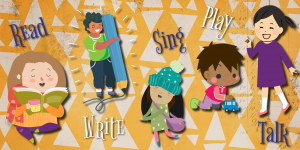
Play, along with talking, singing, reading, and writing, is one of the five early literacy practices that supports a young child’s language development.
Play, especially dramatic or pretend play, gives children the opportunity to assign meaning to words and concepts they learn from parents, caregivers, and the world at large. Play complements the other four practices — it’s possible to incorporate talking, singing, reading, and writing into all kinds of pretend play situations!
Play is essential for a child’s healthy development. It gives children the opportunity to work on social skills, practice resilience, and bond with adults, caregivers, and friends. Children are naturally inclined to engage in dramatic play, and the adults in their lives can both engage in and support play as a tool to build language and learning skills.
You don’t need any fancy toys or apps to facilitate dramatic play. All you need is an engaged, caring adult (that’s you!), and the ability to notice the focus of your child’s attention.
Today we won’t talk about specific examples of play that you can engage in with your child, but rather a framework for engaging with your child while you’re spending time with them. It’s from the Harvard Center on the Developing Child, and it’s called Serve and Return, which is also great for engaging your child in conversation.
When your child serves, or shows interest in a person, place, object, or idea, return that serve by acknowledging and talking about their interests. Children need adults that are responsive and attentive to their needs. By using Serve and Return, you are helping your child feel seen, loved, and cared about, all of which are essential for healthy brain development.
Here are the five steps of Serve and Return:
 Notice the serve and share the child's focus of attention.
Notice the serve and share the child's focus of attention.
Your toddler is babbling and pointing at the family cat. Bend down and point at the cat, too. Adjust your focus so that you see the world through your child’s eyes.
Return the serve by supporting and encouraging.
Smile at your child. Say, “You really like Socks, don’t you?” Encourage the cat to come over, or move closer to the cat.
Give it a name!
Say, “Socks is our cat. She is part of our family, just like you. She likes it when you pet her nicely, like this.” Show your child how to pet the cat. Socks rolls over on her back and your child giggles. Follow your child’s cues and giggle, too!
Take turns…and wait. Keep the interaction going back and forth.
Let your child pet the cat, and smile and nod as appropriate, or talk more about the cat and her likes and dislikes. Sing a nursery rhyme, such as “Hey Diddle Diddle, the Cat and the Fiddle,” or make up your own song about Socks! In all interactions, give your child a chance to respond. It’s very important to wait for your child to formulate a response. Children need practice turn-taking, which helps to develop self-control. They also need time to develop their own ideas, which builds confidence.
Practice endings and beginnings.
Your child loses interest in the cat, and instead walks away and picks up their favorite toy truck. As time permits, you can practice the sequence of Serve and Return again, with the truck this time. With a little practice, it will become a normal way to interact with your child.
Your responses will look different depending on the age and ability of your child.
Think of Serve and Return as a game of catch. You want to keep throwing the ball back and forth until the game is over.
 Support and build upon your child’s interests by checking out books on their favorite subjects (like cats and trucks) from the library.
Support and build upon your child’s interests by checking out books on their favorite subjects (like cats and trucks) from the library.
For more information on Serve and Return, visit the Harvard Center on the Developing Child.
Sources:
- Han, M., & Dr. Han’s Tips for Successful Pretend Play at School. The Power of Pretend Play in Language & Literacy Learning: Expert Advice. The Genius of Play. https://thegeniusofplay.org/genius/expert-advice/articles/the-power-of-pretend-play-in-language-and-literacy-learning.aspx.
- Serve and Return. Center on the Developing Child at Harvard University. (2020, January 27). https://developingchild.harvard.edu/science/key-concepts/serve-and-return/.
-Davida, Children's Librarian at Woods Memorial Library
 Read, Write, Talk, Sing, Play!
Read, Write, Talk, Sing, Play!
Play comes so naturally to children and is an essential element to lifelong success. When children play, they are practicing and perfecting early literacy and life skills!
Read more about early literacy and how you can make a difference in your child's life.

